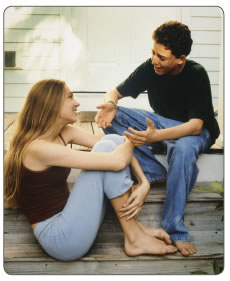|
Listen to the dialog. Beth and Dave are talking about their past weekend. 
Fill in the blanks to complete the dialog. Use the correct verb tenses.
听对话。Beth和Dave在谈论他们的上个周末。请用动词的正确形式填空完成下面的对话。 |
|
1.Let’s look at the video of teacher.
让我们看看老师的示范练习。
|
| |
Listen again and check your answers. 
再听一遍录音并检查你的答案。 |
| |
|
What did you do last weekend? Write four sentences that describe your weekend activities.
你上个周末做了什么?写四个句子来描述你上个周末的活动。
|
|
| |
Pair Work 
You and your partner discuss your weekend activities. Use the sentences in the Take Note of last page. Make up a dialog and present it to the class.
你与一名同伴讨论你们的周末活动。使用上一页Take Note中的句子,编一段对话并表演给全班同学。
|
1.Let’s look at the video of teacher.
让我们看看老师的示范练习。
Please finish this practice according to the following strategy.
你可以按照下面的策略来完成这个练习
|
| |
| Take Note For Interest |
Leisure can be divided into active leisure and passive leisure. Active leisure requires energy, such as playing sports. Passive leisure does not require energy, for example, watching TV.
休闲可以分为主动休闲和被动休闲两类。主动休闲需要消耗体力,比如做运动;被动休闲不会消耗体力,比如看电视。
The idea of leisure is not as old as you may think. Concepts of leisure and leisure time came about in the late 19th century with the Industrial Revolution. Machines made work more efficient, and the average work week was gradually reduced by over twenty hours. The extra free time/leisure time allowed workers to engage in more activities outside of work.
休闲的概念的历史不像你想象的那么长。休闲的概念和时间是在19世纪末期,伴随着工业革命的开始才产生的。机器使工作更有效率,每周的工作时间平均缩短了二十多个小时。多余出来的自由时间/闲暇时间允许工人们在工作之外参加更多的活动。 |
| Let’s watch the teacher’s video. 
让我们看看老师的视频讲解 |
|
| |
|

